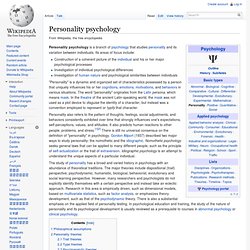

Personality psychology. Personality psychology is a branch of psychology that studies personality and its variation between individuals.

Its areas of focus include: Construction of a coherent picture of the individual and his or her major psychological processesInvestigation of individual psychological differencesInvestigation of human nature and psychological similarities between individuals "Personality" is a dynamic and organized set of characteristics possessed by a person that uniquely influences his or her cognitions, emotions, motivations, and behaviors in various situations. The word "personality" originates from the Latin persona, which means mask.
In the theatre of the ancient Latin-speaking world, the mask was not used as a plot device to disguise the identity of a character, but instead was a convention employed to represent or typify that character. The study of personality has a broad and varied history in psychology with an abundance of theoretical traditions. Philosophical assumptions[edit] 1. 2. The Science of Personality. The Personality Project.
4 Personality Traits That Make You an Effective Leader. What makes a good leader?

Which personality traits do the best trailblazers share? Every organization has its own benchmarks for determining who would make the best head of its teams, but are those qualities really all that different? Research in the field suggests that, on a broad level, employees and employers are looking for similar characteristics in their leaders -- no matter what business they're in. Here are four personality traits that people want in a boss. Related: 5 Influential CEOs Weigh in What Makes a Good Leader 1. Results form a November 2014 Pew Research Center Survey showed that 84 percent of the 1,835 respondents considered honesty the most essential personality trait for any leader. Honest leaders inspire not just through words but through actions. 2. In the world of personality evaluation, openness is one of the Big Five dimensions of personality that psychologists use to evaluate individuals. Related: The 8 Signs of a Bad Leader 3.
Leaders make decisions. 4. 8 Personality Traits. Are You a Type A or B Personality? 10 Psychological States You've Never Heard Of... and When You Experienced Them. Role of Schemas in Personality. Can People’s Personalities Change? Has one of the oldest questions about personality been answered?

For many years personality psychologists gave the same answer as any pessimist: no, people’s personalities don’t change. This was even more true once they got to 30-years-old. By that time, it was thought that if people preferred their own company or were overly neurotic, they tended to stay that way. In the last 15 years, though, this view has changed. Instead of personality being set in stone at 30, now evidence is emerging that there is some change. To settle this you’ve got to look at whether the typical changes in personality over time really affect people’s lives. This is exactly what Boyce et al. (2013) looked at for all five aspects of personality: extroversion, agreeableness, openness-to-experience, conscientiousness and, of course, neuroticism. They used data from a large Australian survey of 8,625 people over two years. Secondly, they confirmed that people’s personalities had shifted over the two-year period.
Reciprocal Determinism. Relationship of Personality to Performance Motivation. Personality, Performance & Productivity.